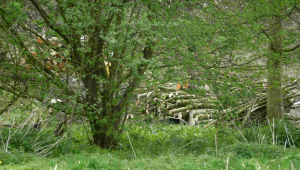Update May 2016
PC David Hart, mentioned below, is no longer a member of the West Mercia Wildlife Unit. See the West Mercia police website for the latest Shropshire contact.
Main article 25 May 2015
When can developers chop down trees? The short answer is anytime. Unless they disturb nesting birds, fall foul of Tree Preservation Orders or the work is extensive enough to require a licence from the Forestry Commission.
This article is about disturbing birds. It follows two recent incidences of tree cutting on developments in Ludlow during the nesting season. I am making no suggestion that birds or their nests have been harmed during these operations but I thought it would be useful to clarify what the rules are. I can’t comment on specific cases until I get further information from officers.

Birds and the trees
There is a common confusion, which I shared until a few weeks ago, that it is an offence to fell trees during the nesting season. This is not the case. Anyone, a developer, landowner or householder can fell a tree or cut or clear a hedgerow. But:
If any person intentionally: kills, injures or takes any wild bird; takes, damages or destroys the nest of a wild bird; takes, damages or destroys the nest of any wild bird while that nest is in use or being built; or takes or destroys an egg of any wild bird; he shall be guilty of an offence.
This wording is from Section 1 of the Wildlife and Countryside Act 1981. The 2009 Birds Directive from the EU also bans activities that directly threaten wild birds, such as the deliberate killing or capture of birds, the destruction of their nests and taking of their eggs, and associated activities such as trading in live or dead birds, with some exceptions.
The critical point here is that legal protection is for birds, their nests and their eggs, not the trees or bushes in which they nest.
The main nesting season is not defined in the Wildlife and Countryside Act. It is recognised as running from 1 March to 31 July but it could extend earlier or later. Shropshire Council defines the nesting season as extending from March to September inclusive.
Most farmers are not allowed to cut hedgerows between 1 March and 31 July under rules attached to the payments they receive under the Common Agricultural Policy. There are exceptions to these rules, which include urgent necessity, hedge-laying and coppicing.
Trees and Planning
Planning permissions issued by Shropshire Council typically contain an advisory note on not commencing work in the nesting season and recommending that an experienced ecologist is called in to check whether vegetation is clear of nests. This is what planning officers call an “informative” – it is advice only and cannot be enforced.
It is however a requirement that trees are protected during development, so Shropshire Council will typically issue a planning condition that says:
No ground clearance, demolition, or construction work shall commence until a scheme has been approved in writing by the local planning authority to safeguard trees to be retained on site as part of the development… Reason: To safeguard existing trees and/or hedgerows on site and prevent damage during building works in the interests of the visual amenity of the area.
There is no mention of birds or nests in this condition because they are covered by the Wildlife and Countryside Act. The council will also typically issue a condition to ensure the roots of a tree are not disturbed (RPA: root protection area).
Many trees will be covered by Tree Preservation Orders which prohibit the cutting down, topping, lopping, uprooting, wilful damage or wilful destruction of trees without the local planning authority’s written consent.
In a conservation area, six weeks’ notice must be given to cut any tree – a period which allows Shropshire Council to consider whether to issue a Tree Protection Order.
Birds and the Police
The West Mercia police website does not give any useful information on wildlife crime and refers the reader to the RSPB. This is the advice given by the RSPB:
If you suspect an offence is/has been committed in relation to wild birds then contact your local Police Force and report the incident to them. Ask for the case to be investigated by a Wildlife Crime Officer (WCO) if possible and ask for an incident number so you can go back to them if needed. If the offence is on-going report it to the Police on the 999 system.
PC David Harte is one of a small number of wildlife officers in West Mercia police. He told me recently that the wildlife officers do not investigate crimes themselves but advise local officers. He wrote:
The offence is disturbing the nest of a bird, not cutting hedges or trees. It is not an offence [subject to relevant permissions] to cut hedges or trees during the nesting season as long as you don’t disturb a nesting bird.
The wildlife officers act as advisory to other officers, our role is to assist officers in their investigation but we do not attend all wildlife crime as we often cover entire counties.
If you do have evidence that nesting birds have been disturbed or animals that are protected have been disturbed, call 101 and request if an officer can attend. However evidence is the clear factor, if there is no evidence of damaged nests it would make it almost impossible to prosecute.
By evidence, PC Harte means photographs of damaged nests and information on the species of birds. This can be very difficult to obtain on development sites where the public does not have access.
Further information
Report a crime online to West Mercia police
Planning guidance on Tree Preservation Orders
Forest Commission felling licence

